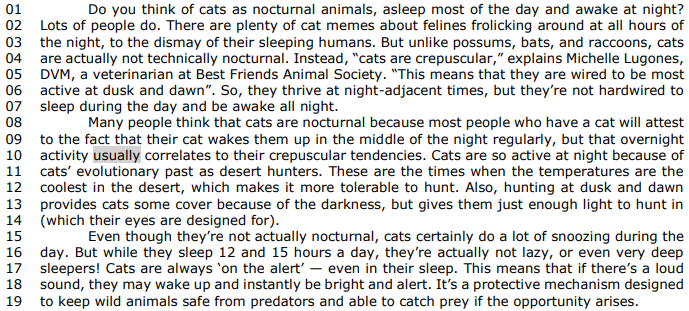Questões de Concurso
Sobre interpretação de texto | reading comprehension em inglês
Foram encontradas 9.443 questões
Based on the text above, judge the following item.
Plant ecology has become less relevant due to the lack of
qualified people to work in it.
Based on the text above, judge the following item.
Many professionals other than those who work directly with
plants should be educated in plant identification.
Based on the text above, judge the following item.
Planting trees may not always be beneficial to the
microenvironment in which they are planted.
Based on the text above, judge the following item.
Although children are not learning enough about plants in
basic school, there are still a significant number of higher
education students who have basic botanical knowledge.
Leia o cartum para responder à questão.

(https://www.lingvolive.com)
In the cartoon,
Leia o texto para responder a questão.
English as a Lingua Franca
A number of researchers have studied conversations in English as a Lingua Franca and have noted a number of somewhat surprising characteristics, including:
• Non-use of third person present simple tense -s (She look very sad).
• Interchangeable use of the relative pronouns who and which (a book who, a boy which).
• Omission of articles where they are mandatory in native-speaker English.
• Increasing of redundancy by adding “inexistent” prepositions (We have to study about…, The article treats of…).
• Pluralisation of nouns which are considered uncountable in native-speaker English (informations, staffs).
The evidence suggests that non-native speakers are not conforming to a native English standard. Indeed they seem to get along perfectly well despite the fact that they miss things out and put things in which they ‘should not do’. Not only this, but they are actually better at ‘accommodating’ - that is, negotiating shared meaning through helping each other in a more cooperative way - than, it is suggested, native speakers are when talking to second language speakers (Jenkins 2004). In other words, non-native speakers seem to be better at ELF communication than native speakers are.
(Jeremy Harmer, The practice of English language teaching. Adaptado)
Leia o texto para responder a questão.
English as a Lingua Franca
A number of researchers have studied conversations in English as a Lingua Franca and have noted a number of somewhat surprising characteristics, including:
• Non-use of third person present simple tense -s (She look very sad).
• Interchangeable use of the relative pronouns who and which (a book who, a boy which).
• Omission of articles where they are mandatory in native-speaker English.
• Increasing of redundancy by adding “inexistent” prepositions (We have to study about…, The article treats of…).
• Pluralisation of nouns which are considered uncountable in native-speaker English (informations, staffs).
The evidence suggests that non-native speakers are not conforming to a native English standard. Indeed they seem to get along perfectly well despite the fact that they miss things out and put things in which they ‘should not do’. Not only this, but they are actually better at ‘accommodating’ - that is, negotiating shared meaning through helping each other in a more cooperative way - than, it is suggested, native speakers are when talking to second language speakers (Jenkins 2004). In other words, non-native speakers seem to be better at ELF communication than native speakers are.
(Jeremy Harmer, The practice of English language teaching. Adaptado)
Leia a charge para responder a questão.

(twitter.com. Adaptado)


Read the text to answer.
Action on Smoking and Health’s (ASH)
Accomplishments
• 2019 Bucharest Declaration on Human Rights and a Tobacco-Free Europe, coming out of discussion at our Global Forum that continued at the European Network for Smoking and Tobacco Prevention’s Conference the following days. • 2019 Global Forum on Human Rights and a Tobacco-Free World, co-hosted by the Romanian Presidency, Romania 2035 Tobacco-Free Generation Initiative, and theEuropean Network for Smoking and Tobacco Prevention with high level speakers such as the European Commissioner on Health and Food Safety and Princess Dina Mired of Jordan. • 2019 launch of ASH’s Tobacco and Human Rights Hub, a living repository of human rights resources to assist our allies in taking a human rights approach. • 2018 Cape Town Declaration on Human Rights and a Tobacco-Free World, adopted by the World Conference on Tobacco or Health (WCTOH) and over 100 organizations worldwide, which states, “the manufacture, marketing, and sale of tobacco are incompatible with the human right to health”. • A successful campaign with the Danish Institute of Human Rights’ s which resulted in DIHR denouncing tobacco as antithetical to the work of a human rights organization. This campaign also resulted in a sign on letter from 123 organizations in 40+ countries to immediately cease all marketing and production of cigarettes to adhere to human rights norms. • A presentation before the Inter-American Commission on Human Rights, along with two of our partner organizations. This was the first time the Commission considered tobacco as a human rights issue and was an important victory. • An article in the American Bar Association’s International Law Newsentitled Tobacco Industry Marketing: A Violation of Human Rights in Latin America. The article was chosen by another ABA Publication, GP Solo Magazine, to be included in a “Best of the ABA” feature issue.
(Available in: https://ash.org/human-rights. Adapted.)
The text’s composition charcteristics and discourse resources cater to:
Read the text to answer.
The Unicorn in the Garden
(James Thurber.)
Once upon a sunny morning a man who sat in a breakfast nook looked up from his scrambled eggs to see a white unicorn with a golden horn quietly cropping the roses in the garden. The man went up to the bedroom where his wife was still asleep and woke her. “There's a unicorn in the garden,” he said. “Eating roses.” She opened one unfriendly eye and looked at him. “The unicorn is a mythical beast,” she said, and turned her back on him. The man walked slowly downstairs and out into the garden. The unicorn was still there; he was now browsing among the tulips. “Here, unicorn,” said the man and pulled up a lily and gave it to him. The unicorn ate it gravely. With a high heart, because there was a unicorn in his garden, the man went upstairs and roused his wife a gain. “The unicorn,” he said, “ate a lily.” His wife sat up in bed and looked at him, coldly. “You are a booby,” she said, “and I am going to have you put in a booby-hatch.” The man, who never liked the words “booby” and “booby-hatch,” and who liked them even less on a shining morning when there was a unicorn in the garden, thought for a moment. “We'll see about that,” he said. He walked over to the door. “He has a golden horn in the middle of his forehead,” he told her. Then he went back to the garden to watch the unicorn; but the unicorn had gone away. The man sat among the roses and went to sleep. And as soon as the husband had gone out of the house, the wife got up and dressed as fast as she could. She was very excited and there was a gloat in her eye. She telephoned the police and she telephoned the psychiatrist; she told them to hurry to her house and bring a straitjacket. When the police and the psychiatrist arrived they sat down in chairs and looked at her, with great interest. “My husband,” she said, “saw a unicorn this morning.” The police looked at the psychiatrist and the psychiatrist looked at the police. “He told me it ate a lily,” she said. The psychiatrist looked at the police and the police looked at the psychiatrist. “He told me it had a golden horn in the middle of its forehead,” she said. At a solemn signal from the psychiatrist, the police leaped from their chairs and seized the wife. They had a hard time subduing her, for she put up a terrific struggle, but they finally subdued her. Just as they got her into the straitjacket, the husband came back into the house. “Did you tell your wife you saw a unicorn?” asked the police. “Of course not,” said the husband. “The unicorn is a mythical beast.” “That's all I wanted to know,” said the psychiatrist. “Take her away. I'm sorry, sir, but your wife is as crazy as a jay bird.” So they took her away, cursing and screaming, and shut her up in an institution. The husband lived happily ever after.
Moral: Don't count your boobies until they are hatched.
(Available in: http://english.glendale.cc.ca.us.)